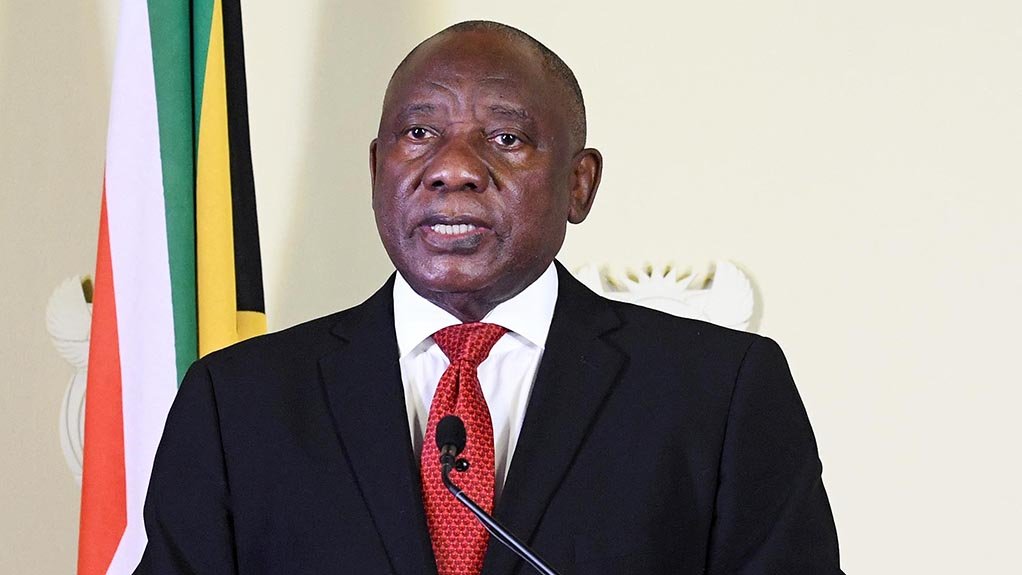President Cyril Ramaphosa, who is up for re-election as head of the ruling African National Congress in December, delivers his annual state-of-the-nation address to lawmakers on Thursday.
The speech, which will take place in Cape Town’s city hall for the first time because part of the parliamentary complex was gutted by a fire last month, is scheduled to begin at 7pm local time.
Here are five key things to watch for:
1. Income grants
The government has been paying South Africans who have no other income R350 a month to help shield them from the economic devastation wrought by the coronavirus pandemic. The grant is set to expire next month and Ramaphosa is facing calls to extend it or introduce an indefinite monthly stipend for the poor. While windfall revenue from a global commodities boom has given the National Treasury some headroom to bolster spending on welfare, he risks extending a benefit that may prove difficult -- if not impossible -- to roll back.
2. Pandemic response
South Africa was ground zero for an outbreak of the omicron coronavirus variant, but has now exited a fourth wave of Covid-19 infections. The country has scrapped almost all pandemic-related restrictions, although civil-rights groups and opposition parties are still urging Ramaphosa to end a state of disaster that’s been in place since the first outbreak in 2020, saying it gives the government too much power. Health department officials counter that they need latitude to speedily take action to reimpose curbs should the need arise again, and Ramaphosa may concur. He is likely to elaborate on plans to make vaccines mandatory at workplaces and some public venues.
3. Energy crisis
Ramaphosa has been promising to address an energy crisis that’s been hobbling the economy since he took office in early 2018, yet the country is still contending with rolling blackouts. The president may outline plans to accelerate and streamline the procurement of more electricity from independent producers and elaborate on the tortuous process of turning around embattled state power utility Eskom Holdings SOC Ltd.
4. Law and order
Ramaphosa has identified the fight against graft, which became endemic during his predecessor Jacob Zuma’s nine-year rule, as a top priority. Efforts are underway to try and recoup the more than R500-billion he estimates was stolen from state coffers, with only a fraction recovered so far and not a single high-profile official successfully prosecuted. A judicial panel that spent the past three years probing what’s become known as state capture recommended that several politicians and officials be investigated and possibly charged. It also came up with a raft of recommendations on how taxpayer funds should be protected. While Ramaphosa has said he will only act on the commission’s report after it’s been presented to parliament, he’s hinted that law-enforcement agencies could be given more money to beef up their capacity. The president may also respond to the findings of a panel that castigated the security services for their handling of riots that erupted last year -- after Zuma was jailed on contempt of court charges -- and claimed 354 lives.
5. Work permits for foreigners
Africa’s most-industrialized economy has long been a magnet for millions of economic migrants from the rest of the continent. Their presence has sparked resentment among many locals, who see them as competitors for jobs, housing and other resources, and there have been intermittent outbreaks of xenophobic violence. Last year, the government said it will end a more than decade-old program that allowed about 200 000 Zimbabweans to live and work in the country. Ramaphosa may announce further measures to try and preserve jobs for locals and reduce a 35% unemployment rate, but will need to ensure any measures don’t stoke undue tension with his peers elsewhere on the continent.
EMAIL THIS ARTICLE SAVE THIS ARTICLE
To subscribe email subscriptions@creamermedia.co.za or click here
To advertise email advertising@creamermedia.co.za or click here











